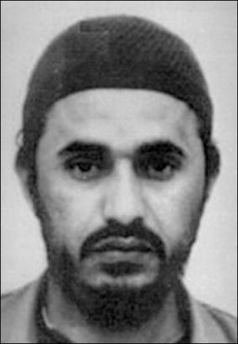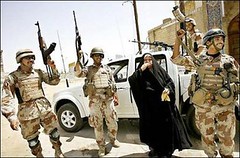He Needed Killing

I suppose every blogger and journalist has created a macro that says, “this doesn’t mean that the war is over,” a point that was made vividly to me when I saw a friend off to a seven-month deployment with the Marines in Fallujah this evening. Insurgencies don’t die with their leaders, they die slowly as the people find better things to do than brood and plot, and progress is almost always painfully gradual.
In the larger war against Islamic terrorists, the significance is greater that it will be on the ground in Iraq, at least in the immediate future. I agree with Andrew McCarthy, who believes that Zarkawi was of greater operational significance than bin Laden and Zawahiri, who appear to be isolated from most of their forces. Zarkawi’s death prevents him from eventually dwarfing them in combat experience, appeal to angry young Muslims, and sociopathic ruthlessness. It is also a dramatic psychological blow to the enemy, and it ought to be lift to us. Put bluntly in my native South Dakotan vernacular, this is a guy who needed killing, and the Iraqis today are literally dancing in the streets. They know.
 With or without this war, Zarkawi would eventually have needed killing. The war in Iraq did not make Zarkawi a terrorist. We know that he had been toying with chemical weapons near Halabja for years, and it’s probable that he was also making friends in the Iraqi Intelligence Service and visiting Baghdad to set up sleeper cells.
With or without this war, Zarkawi would eventually have needed killing. The war in Iraq did not make Zarkawi a terrorist. We know that he had been toying with chemical weapons near Halabja for years, and it’s probable that he was also making friends in the Iraqi Intelligence Service and visiting Baghdad to set up sleeper cells.
The most immediate hope of progress? That this could the way for a few local truces with Sunni sheikhs who are tired of fighting, which could develop into a greater trend. Zarkawi’s goons had been terrorizing local Sunni tribal leaders who were considering peace terms with the Iraqi government. Other al-Qaeda cells will try to continue that task, but they may face at least a temporary a drop in morale, recruits, and contributions. Sheikhs will now be less afraid to oppose them. Zarkawi’s widows will also have the hot breath of Task Force 145 — now freed from the task of chasing Zarkawi and those who entered Hell at his side — on the backs of their necks.
In another sense, one hopes that the demise of Zarkawi (let us hope that it was at least somewhat prolonged and as painful as possible) is part of a greater trend. He is not the only experienced AQ commander killed in Iraq in the past year. I’ve recently read a number of reports suggesting that AQ was already reeling. One example:
Eighty percent of al Qaeda’s network in northern Iraq “has been devastated” since January due to the capture or killing of key leaders and the outrage of Iraqi citizens, a U.S. troop commander told Pentagon reporters today.
Army Col. Robert B. Brown, commander of the 1st Brigade, 25th Infantry Division’s Stryker Brigade Combat Team, reported from Mosul, Iraq, during a videoteleconference that things are looking up in northern Iraq, where “the Iraqi army is being rebuilt” and citizens clearly “want freedom.”
The situation in Mosul is “improving on a daily basis,” Brown said. “Normalcy has come back into the city.”
That wasn’t the case prior to the Iraqi elections held in January, Brown recalled, when his soldiers “faced a foreign fighter that was very well-trained.” However, the situation has changed significantly since then, he said.
Much of this was the result of Zarkawi’s own ruthlessness inspiring Iraqis to rat his confederates out to the police. An Iraqi tip cost Zarkawi his life, too.
Yes, someone will replace him. Every time a commander is killed, someone less experienced and less competent is elevated to replace him. As a result, the enemy makes more mistakes, allowing us to find more of their plans, leaders, and weapons, and to disrupt entire cells and networks. The greater question, of which Zarkawi is only one part, is how many of the mid-level commanders are left, and how good they are.
Photos: AFP.
Afterthought: Could Zarkawi be the most important terrorist “get” so far? Psychologically, there’s not much question that he is. Operationally, I’d put Zarkawi about on par with Khalid Sheikh Mohammad, but above other big “gets” like Abu Zubaidah, Mohammad Atef, and Ramzi Binalsibh. As high-value targets go, I don’t know anyone but bin Laden or Zawahiri who matters more. The most encouraging news of all, however, is that Zarkawi left the United States Army a generous inheritance:
They also found documents and unspecified “media,” which the officer indicated normally means information storage devices such as computer hard drives and digital cameras or other data storage devices.
U.S. military spokesman Maj. Gen. William Caldwell said 39 raids were conducted across Iraq late Thursday and early Friday, including some directly related to the information they obtained from the strike against al-Zarqawi. Those were in addition to 17 raids carried out immediately after the terror leader was killed.
Caldwell displayed digital photographs of recovered items that he said included a suicide belt, a flak vest, passports and identification cards, vehicle license plates, ammunition belts, rifles and other guns and a night-vision device. He said they were found under the floorboards of a building; he did not identify the location, except to say it was in and around Baghdad.
He said at least 24 people had been detained and one person killed in the raids.
Now, I realize that it’s not politically correct to say this, but my desire to stabilize Iraq is not a function of inexhaustible altruism. It’s mostly self-interest. If warlords, militias, or regimes sympathetic to terrorists can control territory, people, and money, they can lend their use to terrorists to do what they did in Sudan and then in Afghanistan — train cadres and organize large-scale attacks. If Iraq were to descend into absolute chaos, it would be unfortunate, but not in itself a causus belli for the United States. It’s the opportunism of terrorism that makes it a causus belli for the United States, meaning that there is at least a temporary unity of interests between the U.S. and Iraq. The most important part of this unity of interests is the destruction of terrorist networks, cadres, weapons, assets, and energy.
If we have taken important steps forward this week, and will continue to do so in the coming weeks, then the United States will have gone far to redeem the hardships that so many now seem astonished to have encountered in Iraq. But with much hard fighting ahead and signs that supporters of terrorism may well have added much of Somalia to their dreary emirate, cause for hope is not cause for complacency.
—–